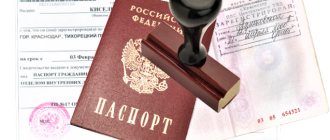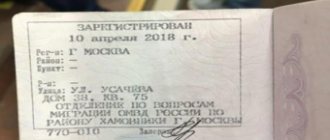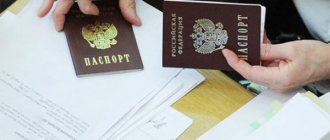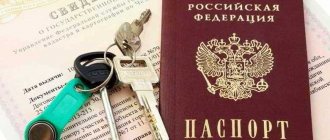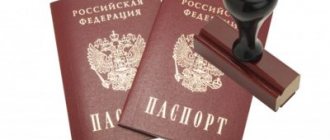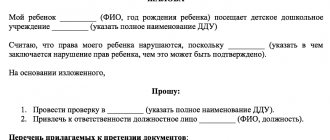All citizens of the Russian Federation are required to have registration. This is stated in the Federal Law “On the right of persons living on the territory of the Russian Federation to freedom of movement.”
The registration procedure will provide citizens with opportunities that are acceptable to exercise their rights and freedoms, and also commit to respecting the rights of both others and the public. Registration was not introduced in order to limit the freedoms and rights of citizens of the Russian Federation. And it does not in any way affect the ability to move freely and choose a convenient place of residence in the country.
Those who own housing are concerned about such a topic as registration of citizens and the rights they acquire at the same time. They are afraid that citizens who will be registered in their apartment will become owners. So, in order to dispel all fears, it is worth studying the topic of citizen registration in more detail.
Attention! The article contains the concept of “registration”, to make the text easier to understand. At the legislative level, it is correctly said - registration at the place of residence.
Temporary registration without ownership rights
Temporary registration is official registration at the current location for a short-term period.
This form of registration allows citizens of the Russian Federation to enjoy all social benefits (medical care, enrolling children in other schools), and for foreigners to avoid paying a fine when traveling outside the Russian Federation. Registration of temporary registration does not negate permanent registration. For foreigners, the period of temporary registration is limited by the validity of a visa or migration card, and citizens of the Russian Federation can regularly extend it if necessary.
Registration without the owner’s permission: is it possible in principle?
A person who is faced with the problem of registering for the first time in a property that is not his own, wonders whether it is possible to register in an apartment without the consent of the owner at all, or whether this point is mandatory under any conditions.
The answer is to be found in legislation. Thus, regulations say that the permission of the owners of living space to register third parties is mandatory. It is expressed at the time of submitting an application for registration in writing.
If it is not possible to be present in person, a notarized written position of the owner is submitted. A sample of its design can be seen below.
Permanent or temporary registration without the consent of the apartment owner is possible only if a minor child is registered with his parents (or one of the parents). In this case, you do not need to ask anyone for permission. It also does not matter whether mom (dad) has ownership rights to this premises.
You can register yourself in your own apartment (or part of it) without asking.
That, in fact, is everyone who can register in an apartment without the owner’s consent.
Permanent registration without transfer of ownership
From temporary, permanent registration differs in more complex procedural relationships between owners and tenants. A citizen of the Russian Federation must register at his place of permanent residence within 90 days. The validity of the registration may be suspended when registering in a new place or when drawing up an extract sheet.
You can receive a stamp for permanent registration without the right to living space on the basis of a rental agreement or an application supported by the necessary package of documents, as well as duly executed permission from all owners. Such permission can be issued at the territorial body of the Ministry of Internal Affairs, MFC in the personal presence of the owner during the submission of documents or in the form of a notarized application.
This is important to know: Permanent registration in Moscow
Can there be registration without the possibility of accommodation?
Some people, having allowed a relative into their home, think whether it is possible that he will not at least live with them. Yes, the law allows for the exclusion of the right to dispose of part of the premises . And this gives relief to the hospitable hosts. But nothing more. If a Russian agrees to officially register a relative or someone else in his living space, but denies him residence, then this threatens with punishment. Criminal Code of the Russian Federation in Art. 322.2 imposes a fine on an unscrupulous owner up to 500 thousand rubles.
From the point of view of the authorities, fictitious registration is not only registration using forged documents, but also an unwillingness to live in the place declared to the authorities.
The procedure for registration without ownership rights in privatized housing
The Constitution of the Russian Federation gives the right to use property at one’s discretion, if this does not contradict current legislation and does not violate the rights of other citizens, including registering or deregistering citizens at the address where such real estate is located.
To register in such an apartment or house, the owner does not need anyone’s permission. This also applies to his children under 18 years of age. If necessary, the owner can register the desired number of people, without observing the standards for recording living space per resident. If the apartment is privatized by several people, the consent of all owners is required to register third parties.
To register, you must submit an application and title documents for real estate to the passport office, MFC, or ter. representative office of the Ministry of Internal Affairs and within 3-8 days depending on the place of submission. The owner can also discharge a tenant at his own discretion.
general information
Who has the right to register someone in an apartment?
Only the owner or officially registered person.
Whatever the quality of the living space - private or municipal.
In the first case, both the sovereign owner of all square meters and the co-owner can register. True, there is one thing here - you will have to obtain the consent of all co-owners .
If the request for registration is addressed not to the owner, but to the official tenant, then again, it cannot be done without the consent of the co-owners.
Are there cases when you can get by “one person at a time”? Legally yes. You can count on this :
- minor children;
- immediate relatives (spouse, parents, adult children) - upon written request;
- co-owner of part of the share
You can find out whether consent from the owner is required for registration from our article.
What are the rules for registering in an apartment? Documents required for registration :
- application in form 6;
- identity cards of everyone involved in the transaction;
- certificate of ownership (or social tenancy agreement, warrant);
- arrival slip;
- documentary consent of co-owners and residents (if we are talking about municipal housing);
- marriage certificate;
- military ID;
- a copy of the personal account and an extract from the house register (for municipal housing).
After this, you will have to wait about a week, after which the resident will either be stamped in his passport stating that he is permanently registered at the specified address, or will be issued a certificate of temporary registration . Information about residents is entered into the house register.
What are the rights of those registered in the apartment who are not the owners? You can find out what rights a person registered in a privatized apartment has in our article.
The procedure for registration in municipal housing
You can register for public housing in one of the following ways:
- based on a settlement warrant issued by the municipality. All persons declared in the order, as well as their minor children, can register;
- having issued the consent of the municipality for registration, subject to the minimum square footage of the premises per tenant (in the Russian Federation, the average standard is 10 m2).
To obtain a permit from the municipality, it is necessary to provide consent from all employers living at the intended registration address. Documents are submitted to the Housing Office, Homeowners Association, MFC or the Ministry of Internal Affairs in the same manner as in the case of privatized housing.
The legislative framework
The basis for registration is established by the Law of the Russian Federation No. 5242-1 “On Freedom of Movement”. The registration procedure is determined by Government Decree No. 713 of July 17, 1995. The administrative regulations for the provision of the service are approved by Government Decree No. 988 of September 12, 2012.
The Family Code does not regulate housing legal relations between spouses. The choice of place of residence remains solely at the discretion of the husband and wife.
Registration without ownership rights. Agreement
When registering strangers at the place of residence, it is recommended to conclude an agreement and have it certified by a notary. Exceptions may be made for a relative or close friends whom the owner completely trusts. In the contract, the parties have the right to specify all the nuances and rules associated with a person’s residence at the place of residence.
The homeowner can determine the amount of payment for utilities, the rules of residence for a citizen and much more. A registered citizen in the contract receives guarantees regarding the duration of residence, settlement and eviction procedures.
The lease agreement must necessarily contain:
- maximum number of registered residents;
- the validity period is indicated (required to obtain temporary registration);
- degree of kinship when relatives settle;
- details of the parties;
- liability for damage to property, late payment, and other violations of the terms of the contract.
This is important to know: Certificate of registration at the child’s place of residence in form 8
The difference between an owner and a tenant
What is the difference between the rights of an owner and a registered person?
The registered person can perform actions, so to speak, of a notification nature - to receive all those civil benefits and opportunities that registration provides in his area, such as: enrolling a child in kindergarten or school, receiving subsidies, tax identification number, issuing an insurance certificate.
He can also register his young child for living space without asking anyone (Article 20 of the Civil Code).
But that's not all. The owner may (in addition to the above):
- register and deregister citizens of the Russian Federation regardless of the degree of relationship (Articles 31 and 35 of the Housing Code);
- sell living space, donate it, transfer it by inheritance, make it the subject of collateral, arrange redevelopment of the apartment (Article 30 of the Housing Code).
If we talk about who has more advantages, then it becomes obvious that the owner - if we are talking about private property, since only he, and not the tenant, is its sovereign manager.
Another thing is municipal square meters . Here the owner of the housing is the state, and all official residents have equal rights with each other. And for any legal action with the apartment, everyone’s consent is required.
The person registered may even give up his share during privatization . True, such a gesture of generosity still does not deprive him of his rights - the citizen will have the right to live in the living space until the end of his days.
However, it is still impossible to say that the owner is the king and God. For example, even after the registration period has expired, he cannot take and put annoying guests out into the entrance or, as is often done, throw their things from the balcony. Eviction and forced deregistration are the exclusive prerogative of the court .
Registration of a child without ownership rights
The child must live with one of the legal representatives, which includes parents, official guardians or state specialized institutions. This provision of the law allows registration of newborns and minor children at the place of residence of the father or mother.
When registering a newborn within 30 days, registration is carried out on the basis of an application from the mother and does not require the presence of the father.
What do you need to know about registering people?
- Any citizen registering on a permanent or even temporary basis is obliged to report this to the Federal Migration Service.
- If you live without registration for a long time, you may receive an administrative penalty, namely a fine.
- An important point is that registration does not guarantee that you will be able to use government services. kindergartens, schools, hospitals and other institutions that are located at the citizen’s place of registration.
- Most people don't realize that there is a big difference between ownership and registration. In the case when you register in housing where there is an owner, you do not become its owner.
How to register in an apartment through State Services
Going to court
The wife can go to court if she has the right to use the apartment, but the husband, as the person in whose name the housing is registered, does not consent to its registration.
The statement of claim is drawn up according to the rules of Art. 131-136 Code of Civil Procedure of the Russian Federation. References must be made to the relevant articles of the Civil Code of the Russian Federation, the Investigative Committee of the Russian Federation, the Housing Code of the Russian Federation and other regulations (depending on the specifics of the controversial situation).
As evidence, written documents must be submitted confirming the wife’s right to unhindered use of housing registered in her husband’s name.
This may be a marriage certificate, which indicates the date of marriage registration - important in order to prove that the apartment was purchased during marriage, and other written documents. In controversial situations, it is advisable to seek the help of a competent lawyer.
Whose consent is required?
To register a wife with her husband in a privatized apartment or municipal housing, the consent of the owner or tenant is required. You will also need permission from all persons previously registered in the living space.
When registering a spouse in a municipal apartment, the consent of the local government authority authorized to provide residential premises under a social tenancy agreement may be required.
Is it possible to register an outsider?
The legislation does not prohibit the owners of residential premises from registering strangers, but here it is worth considering a number of inconveniences that may arise after receiving a mark in the passport :
- The owner of the apartment will not be able to freely dispose of his property: for example, when selling, the consent of all registered residents will be required.
- If you register a stranger who has a minor child in the living space, he will be able to register him without the consent of the owner, and he will be able to register him only after he reaches the age of majority.
It is also worth considering the type of property:
- Privatized apartment. Any person can be registered, because the owner is free to independently dispose of his property. The number of registered persons is not limited by law.
- Municipal. Here, the consent of the landlord and all citizens registered in the living space will be required.
If the living space was purchased with a mortgage and the debt has not yet been repaid, it is necessary to obtain the approval of a credit institution to register a stranger or relative there.
Have a question or need legal help? Take advantage of a free consultation:
Free legal advice by phone:
8 (Moscow and Moscow Region) 8 (St. Petersburg and Leningrad Region) 8 (Regions of the Russian Federation)
Deadlines
The waiting time in line to see a specialist should not exceed 15 minutes. The registration period is 3 days. If the application is submitted electronically, the registration period should not exceed eight days.
Permanent registration does not expire. Temporary registration is issued for a period agreed upon between the spouses.
Read how to register a newborn in a non-privatized apartment. How to extend temporary registration at the place of stay? Information here.
What documents are required for temporary registration in a private house? A complete list is in this article.

